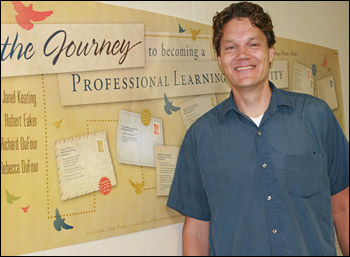|
 |
| |
Superintendent reports on school
story and photo by Solveig Torvik
 Mark Wenzel is in his fourth year as Superintendent of
Schools for the Methow Valley School District.
The district is one of the plaintiffs in McCleary vs. State, which seeks to force the state of Washington to abide by its constitutional duty to "amply" pay for "basic" education of Washington’s youngsters. A superior court ruling favored the plaintiffs, the Network for Excellence in Washington Schools. The state supreme court, mulling an appeal of that ruling by the state, is expected to issue a decision in two or three months, says Methow Valley School Superintendent Mark Wenzel, who attended a court hearing on the case.
"I hope I’m wrong. I was a little bit discouraged," says Wenzel. What he heard from the justices gave him the impression that they "seemed to be concerned that they have limited power to force the legislature" to provide more education funding.
Despite the downward trajectory that in recent years has seen Washington plunge to the bottom tiers among the 50 states in education funding, the Methow Valley School District has been kept whole by voter passage of local levies. "We’ve got good local support," Wenzel says. Voters approved a maintenance and operations levy that provides 24 per cent of the district’s $6.7 million operating budget, plus a technology levy and a capital construction bond.
"To me it feels really good to be part of a community that has stood up for education as a value," Wenzel says. But, he warns, "We’re at the levy lid." The district is maxed out for maintenance and operations levy funding.
"That tech levy saved us," Wenzel adds. It allowed the district to keep the academic program whole and to keep a reserve fund of $150,000, an amount Wenzel acknowledges is low; it should be $300,000.
The Methow Valley School District is something of an anomaly. Because of the high property values in the valley, voters here pay only $1.65 per $1,000 of assessed valuation at property tax time for schools, while Okanogan School District’s voters, whose properties collectively are worth less, fork over $5.75 per $1,000, the highest rate in the county.
This might lead to the erroneous conclusion that students in the Methow Valley School District are largely drawn from well-to-do backgrounds. In fact, half of the student body meets the federal criteria for free/reduced school lunch.
A new teacher evaluation system is in the works this year, says Wenzel. "The old one was bad." More attention will be paid to such things as student engagement, for example. Because the mandate of public schools is to educate all youngsters, regardless of their backgrounds and abilities, teachers are putting renewed emphasis on individualized learning methods, he says.
Thanks to the technology levy, 40 I-Pads are available this fall for third-graders to help them master math and reading. The I-Pads will assist with the goal of greater individualization of learning, says Wenzel. "It allows a lot of self-guided work, with teacher support."
Class size has remained comparatively small in the district, where elementary teachers typically have between 16 to 26 students per class and high school teachers 20 to 25, according to Wenzel, 46, who was hired in 2008.
Asked to comment on the drumbeat of reports that show American students falling behind those from other developed nations in math, science and other academic subjects, Wenzel replies: "So many of the countries we’re compared to have nowhere near the poverty level we do." Poverty is the primary factor in academic achievement, he says, not race. If the international test results are adjusted for poverty, Wenzel adds, "We’re in the top five percent in math and science."
Although this is a small, rural school district, it offers high school students Advanced Placement English and U.S. History, and 25 students are studying Chinese, now the fastest-growing foreign language taught in American schools, according to Wenzel. But Advanced Placement courses in sciences such as physics and chemistry are not on offer because teachers here feel those courses largely are memorization-based, he says.
Wenzel is the father of two-year-old Ruby. He sometimes acts and sings at the Merc Playhouse in Twisp, where his wife Julie is artistic director. He came to education via a non-traditional career path. He’s been a broadcast journalist in Korea, a public information officer in the state legislature, and communications director for the Bethel School District near Tacoma. He taught English as a second language for six years in junior high, high school and college classrooms in the United States and Asia. His undergraduate degree from Earlham College is in Japanese Studies, his master’s degrees from the University of Washington and London School of Economics are in International Studies and Media/Communications respectively, and he holds a doctorate from the UW in Education Leadership.
In 2000, fresh from the London School of Economics, he returned to Washington to head the communications effort for Initiative 728, which sought smaller class sizes. As a result, "I got hooked" on an education career, he says. "I’ve been a student and teacher my whole life," he adds. "I have a passion for learning."
He accepted the job in the Methow not only because of the lovely geography. "The community spirit drew us," he says. He saw the ingredients necessary to build an "amazing" school district in the Methow, he says. The teaching staff impressed him as being not just teachers but learners, and the school board was, and still is, great to work with, he says. "I won’t work in a place that has a dysfunctional board."
9/1/11
|
|
|
|
